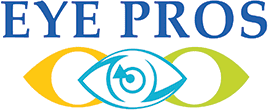Monovision: A Unique Approach to Correcting Both Near and Far Vision

As we age, vision changes can become a daily frustration, especially when we start needing different prescriptions for tasks like reading up close and seeing clearly at a distance. Many people turn to bifocals or multiple pairs of glasses to address these challenges, but monovision offers a unique alternative. Monovision is a vision correction method designed to allow one eye to focus on near tasks while the other manages far vision, giving you the benefit of clear sight at all distances without constantly switching lenses. This article dives into what monovision is, how it works, and who it’s best suited for, whether through contact lenses or surgery like LASIK. If you’re considering monovision, a consultation with an eye doctor at Eye Pros can help determine if it’s the right choice to meet your vision needs and simplify your daily routine. What is Monovision and How Does it Work? Monovision is a specialized vision correction technique that involves correcting one eye for near vision and the other for distance. By designating one eye to handle each task, monovision helps you see clearly at different distances without relying on bifocals or multiple pairs of glasses. Monovision Explained In a monovision setup, the dominant eye is typically corrected for distance vision, while the non-dominant eye is adjusted for near tasks like reading. This approach allows each eye to take on specific visual tasks, reducing the need for external aids. How the Brain Adapts Although it might seem strange at first, the brain learns to adapt by balancing inputs from each eye. Over time, it can naturally switch focus between the eyes as needed, allowing you to see up close and far away comfortably. Monovision for Presbyopia Monovision is especially popular among people with presbyopia—a common age-related condition that makes near vision more difficult. Monovision provides a simple solution to manage both near and distance vision needs simultaneously. This technique can be tried with contact lenses first, allowing you to experience monovision and see if it suits your lifestyle. Consulting with an eye doctor at Eye Pros can help you understand how monovision might fit into your vision care plan. Monovision Options: Contact Lenses and LASIK When considering monovision, you have two primary options: contact lenses and LASIK surgery. Each method offers unique benefits, and the right choice depends on your lifestyle, comfort, and vision needs. Monovision Contact Lenses Monovision can be achieved using contact lenses, where one lens is prescribed for distance and the other for close-up tasks. This non-surgical approach allows you to test how monovision works for you. If you find it effective and comfortable, contact lenses can be a long-term solution. The flexibility of trying monovision lenses also makes it a great starting point for those new to this vision correction method. Monovision LASIK Surgery For those seeking a more permanent solution, monovision LASIK is an option. LASIK surgery involves reshaping each eye’s cornea to correct for different distances. This method provides the benefits of monovision without the need for daily lens care or the hassle of swapping glasses. However, LASIK is an irreversible option, so an eye doctor will typically conduct a trial with monovision contacts first to ensure it’s a good fit. Choosing the Right Method Both contact lenses and LASIK offer advantages, but the choice largely depends on your comfort with each method. An eye doctor at Eye Pros can help you determine which option best suits your lifestyle, ensuring you achieve effective vision correction with maximum convenience. Each method provides a unique way to experience the benefits of monovision, and a consultation can help you find the ideal solution for your vision needs. Who is a Good Candidate for Monovision? Monovision can be a great solution for many people, but it’s not ideal for everyone. Factors for determining candidacy: Typical Candidates: Monovision is especially beneficial for those experiencing presbyopia, an age-related condition that affects near vision. Individuals who are tired of switching between glasses for different tasks may find monovision particularly helpful. Vision Testing: A trial period with monovision contact lenses is often recommended to see if you can comfortably adjust to the vision shift. This trial allows you to experience monovision in daily activities, such as reading and driving, before committing to a permanent solution like LASIK. Consult an Eye Doctor: Since monovision doesn’t work well for everyone, consulting an eye doctor is essential. Some people find it challenging to adjust to the differing focus in each eye, while others adapt easily. An eye doctor at Eye Pros can perform tests to assess your suitability and help you explore whether monovision could simplify your vision correction needs. Determining candidacy is an important step, and expert guidance can ensure that monovision is the right fit for your vision and lifestyle needs. Benefits and Drawbacks of Monovision Monovision offers a unique solution for people with both near and far vision needs, but like any vision correction method, it has its advantages and potential drawbacks. Here’s a closer look: Benefits Reduced Dependence on Glasses: Monovision allows you to manage both near and far vision without the need for bifocals or multiple pairs of glasses. Convenient for Daily Tasks: This approach simplifies daily activities, making it easier to switch between tasks like reading, driving, and using digital devices. Alternative to Bifocals or Multifocals: For those who dislike the look or feel of bifocals, monovision offers a streamlined solution. Potential Drawbacks Reduced Depth Perception: With each eye focused on a different distance, some people experience reduced depth perception, which can affect activities like sports or driving. Adjustment Period: The brain takes time to adapt to monovision, and it may feel disorienting initially. An adjustment period is often required before the vision feels natural. Not Ideal for Everyone: Some individuals may find it difficult to adapt to monovision, especially if they rely heavily on depth perception for work or hobbies. Trial Period for Comfort Many eye doctors recommend a trial period with monovision contact lenses to help patients determine if
